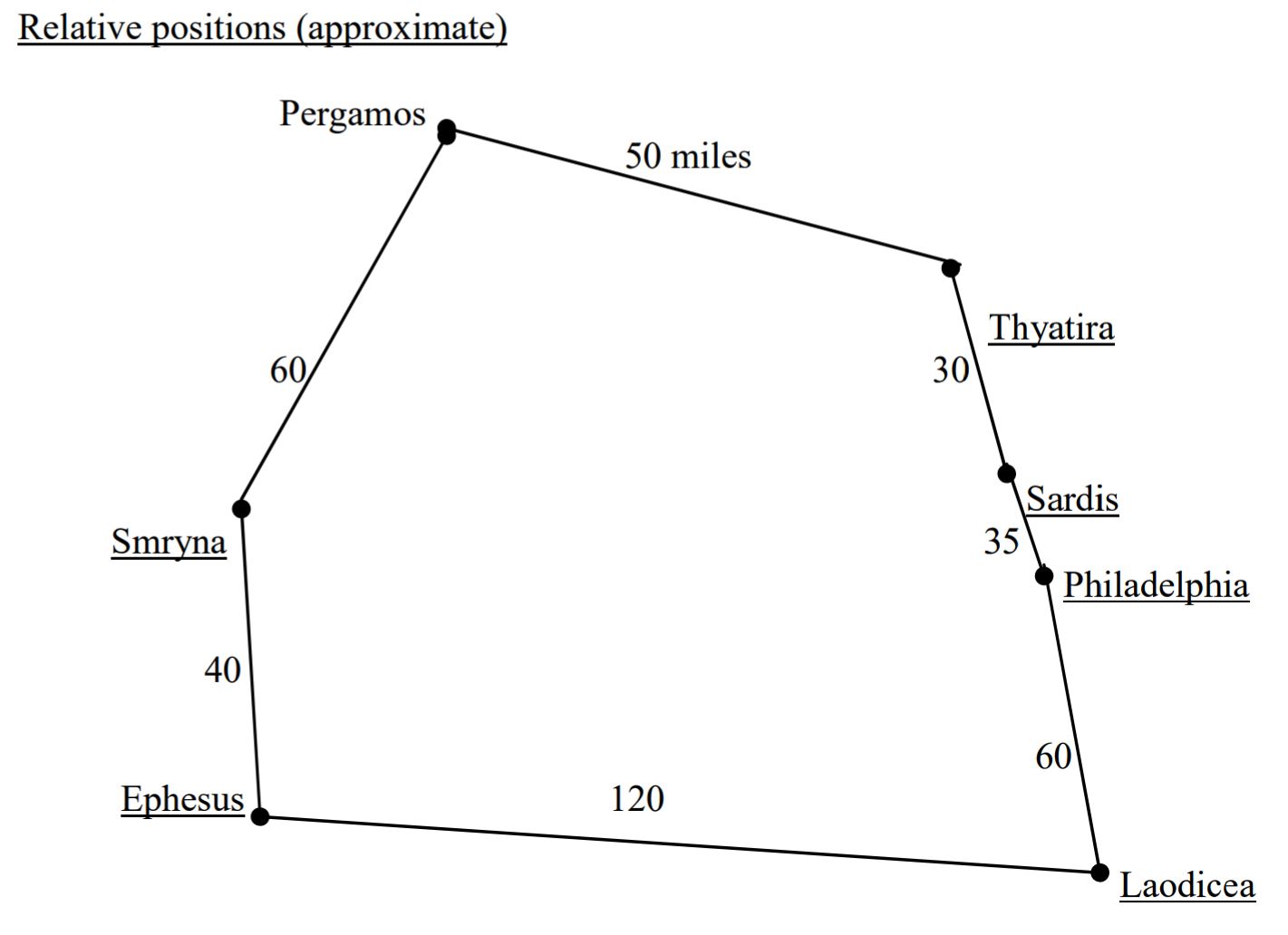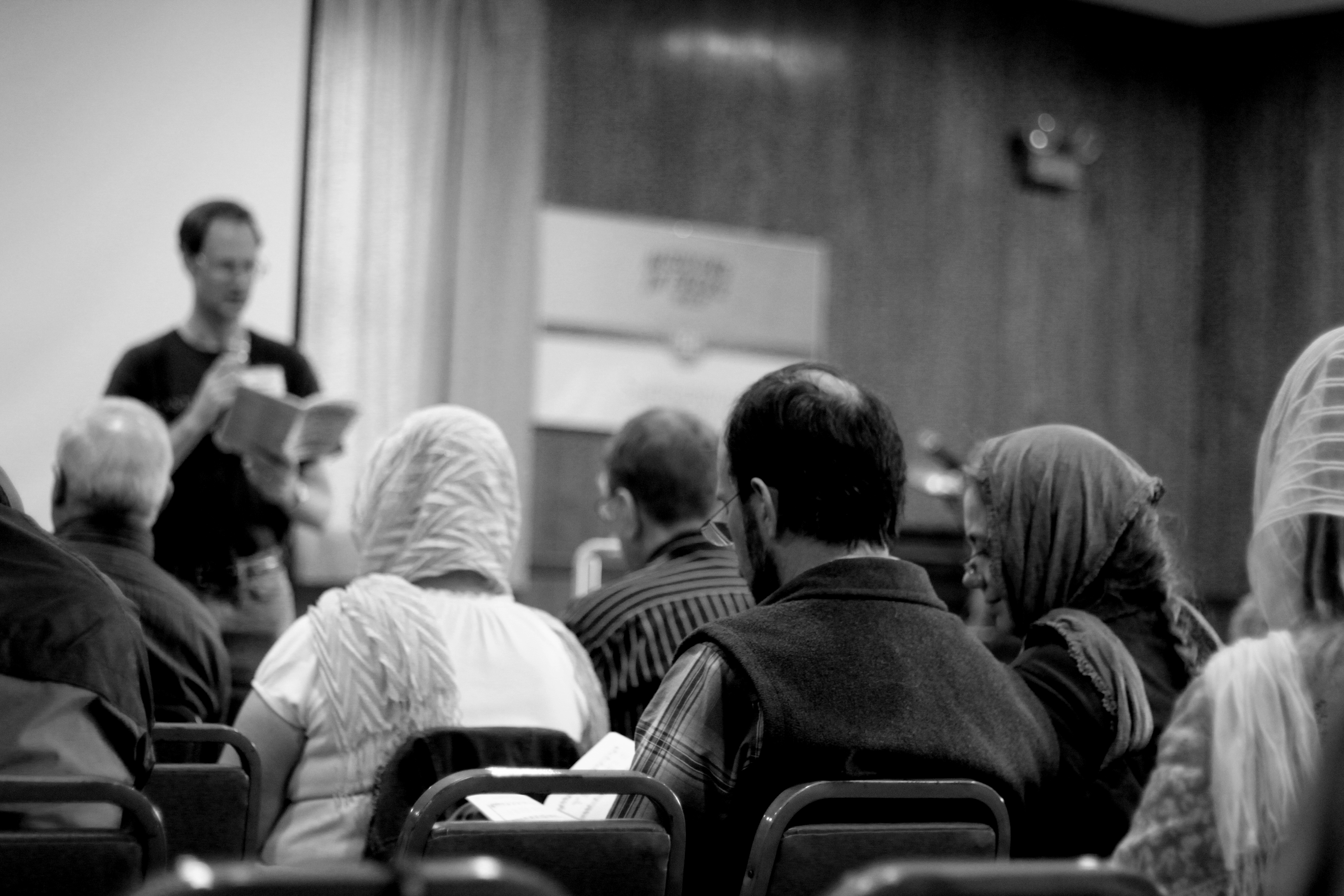Addresses to the Seven Churches in Asia

Revelation 2 and 3
Introduction
The Book of Revelation shows how God will bring His ways on earth to a fitting climax, for His glory and for the honor of His Son, our Lord Jesus Christ. Both blessing and justice will be universally manifested in the world to come. For these reasons, the text of the book, and the concepts involved, are replete with many sets of "sevens," each one indicating the completeness or fullness of some concept or process; usually in a good way, but occasionally for evil. There are well over fifty "sevens" in the book. Seven spirits, stars, angels, letters, churches, seals, trumpets, vials, are important examples.
Revelation 1:1-3
The book was written to suffering saints at the end of the first century A.D. There were relatively few scholars; no bibles as we now know them. As in the days when Samuel was born, "the word of the Lord was precious (rare) in those days" (1 Sa. 3:1). We can thus understand the significance of the expression: "Blessed is he that readeth." As in 1 Timothy 4:13 ("give diligence to reading") this refers to the public, audible reading of scripture. How strange! The only book which carries a specific promise of blessing to the reader is also one of the most neglected.
"Read" - this might be a dying habit, even perhaps amongst some of the Lord’s people, but it is certainly a good habit. We tend to be creatures of habit. Let us cultivate the good habit of reading aloud the text of Holy Scripture.
"they that hear" - the audience, the congregation, those in whose hearing the reader reads aloud. Thank God there are still those who are willing to gather together to hear the reading of the word of God. We read in 1 Peter 2:2, "As newborn babes, desire the sincere milk of the word, that ye may grow thereby." The constant challenge is, have we still as avid an appetite for the word of God as when we first believed the gospel?
"they that keep" (observe, guard, prize, treasure, obey, act upon) - This is directed to both reader and congregation. It is not automatic by any means. It requires exercise, faith, and a preparedness simply to obey both the spirit and the letter of what the Lord makes plain to us through His word. Blessing and blessedness are promised to the one who reads (audibly), they who listen to the reading, and particularly to they (reader and hearer) who are prepared to obey the word read. This promise was specifically and especially made to the suffering saints at the time it was written. Just as clearly, it continues to have a special voice to suffering saints in any day.
"the time is at hand" (near) - If so then, almost two thousand years ago, how much more so now?
The Book readily splits up into 3 major sections, as defined in 1:19: "Write":
- "the things which thou hast seen" - chapter 1: the vision of the Judge
- "the things which are" - chapters 2 and 3: the seven churches (to be considered as we proceed)
- "the things which shall be after these things" - chapters 4-22: judgment (embracing the great prophetic events that will take place after the church period is closed).
The present exercise is to meditate on the addresses to the seven churches in what was then called Asia, but now forms part of Turkey. What is in mind is not a comprehensive exposition, but one or two pointers. The diligent student of scripture will follow up the detail.
Revelation 1:12-18 The Vision
Before the assemblies were addressed, we are first of all introduced to the Lord, the Righteous Judge (2 Ti. 4:8), in all His regal glory. This was done in a vision to the Apostle John, and is recorded in chapter 1:12-18. There is much in the detail to command our interest, attention and, indeed, our obedience. A brief summary of the pertinent features will suffice for the kind of study we hope to pursue.
| Text | Meaning/Significance/ Application |
|---|---|
| Seven golden lampstands | Churches, local assemblies, bearing light on earth. |
| In the midst | He knows what is going on. |
| One like unto the Son of Man | Characteristic moral features. In His life on earth, the term Son of Man indicated the place of humiliation He willingly accepted in lowly manhood. Here, it is used of Him in His judicial glory. |
| Garment down to the feet | Priestly apparel. |
| Girt about the paps with a golden girdle | Divine constraint in righteous judgment |
| Head, hairs white like wool, white as snow | Veneration, wisdom (see Daniel 7:9) |
| Eyes as a flame of fire |
Constant, penetrating scrutiny. ("Thou, God, seest me" Genesis 16:13). See also John 1:9 Light discloses the heart of God! Light exposes the heart of man! |
| Feet like fine brass | Shod for the execution of righteous judgment. |
| Voice as sound of many waters | Grandeur, majesty, relentless power. |
| In His right hand seven stars | Stars - giving light from heaven. Individual light-bearers - those who locally guide the assembly according to the will of God. We have no light independent of Him. |
| Out of His mouth a sharp, two-edged sword |
His word will suffice. (John 12:48) |
| Countenance | as the sun shineth in its strength |
| Light of the World | relative to the world. |
| Sun of Righteousness | relative to Israel. |
| Morning Star | relative to the church |
| First and Last |
Said three times of Jehovah in Isaiah (41:4, 44:6, 48:12). Said three times of Jesus in Revelation (1:17, 2:8, 22:13) |
| Angels | Someone in touch with heaven. Indicative of authority and power, rather than intimacy. Representative of the responsible element in any assembly. Leadership is local (carrying the burden of the meeting) but gift is universal. In scripture, leaders are always spoken of in the plural, except one reference in Hebrews 12:2 (JND) to Christ Himself as The Leader. In leadership, as in all things, He must have the preeminence (Col. 1:18) |
| Death - the (intermediate) destination/condition of the body, the material part of the person. | |
| Hell/Hades - the (intermediate) destination/condition of the soul and spirit, the immaterial part(s) of the person. | |
|
Together, the immaterial and material parts constitute the whole/entire person. See 1 Thessalonians 5:23 - "your whole entire spirit and soul and body." |
|
The Addresses to the Seven Churches
The seven churches (local assemblies) may be viewed:
1. Preteritically (historically)
These addresses outline for us the history and spiritual condition of seven local assemblies, which did actually exist and operate at the same time in the first century AD in what we now know as Western Turkey. It is a sad fact that usually we are more likely to pay attention and learn any necessary lessons when the example under scrutiny is someone or something other than ourselves. The consideration of these churches, which were actual historical entities, is a lesson book in itself, but much, much more than merely a history lesson.
2. Personally (individually)
In addition, they can quite fairly be considered to be the spiritual and moral history (spiritual life cycle?) of an individual soul. Knowing ourselves as we do, we recognize that we fluctuate in our interest and degree of commitment to the Lord and in the freshness of our souls. At any moment, or phase, in our spiritual history as individuals, we almost certainly compare with the state of one or other of the seven churches as they were discerningly described in these two chapters. We must, however, guard against gaining the impression that we can ever reach or achieve a high plateau of state or experience where we are beyond the need to hear the challenge of the Holy Spirit’s call.
3. Parochially (locally)
In addition, they can legitimately be seen to outline the spiritual and moral history (spiritual life cycle?) of a local assembly. What is true of us as individuals is almost certainly also true of our local assemblies. What we are as individuals makes up what we are locally and collectively as an expression of the assembly.
4. Prophetically (panoramically)
A major valid interpretation discerns in these seven addresses the projected ecclesiastical and moral history of the whole of the church period (full dispensational life cycle?) from Pentecost to the Rapture. That is, they give us a panoramic survey as to how the Christian church has and will fulfill its responsibilities between when it was inaugurated on the Day of Pentecost, and the Rapture, when its responsible history in this world will be brought to an end.
Relevance of historical and geographical data, and of some of the words in the text
Each of the seven places was the centre of a zip code district under the Roman administration. Postal services had their proper place even in those early days. Of course, brethren would use their own couriers to transmit these and other important letters. It is interesting, nevertheless, to see that the all-knowing, all-wise God had allowed men to devise and set up a system that would be useful to Him to do His own work, if He considered it expedient for Him to do so.
It is interesting that the seven assemblies lie on a circular route which can easily be covered in the same order in which the addresses are given. A courier delivering the letters would take the same route, in clockwise order, as presented in the text, beginning with Ephesus, and ending at Laodicea. Some of these localities have different names now to what they bore in the first century AD, although some of the names persist to this day.

There is breakdown in the churches, internally and externally. The addresses to these seven churches are to stimulate the affections now to hold on till He comes, and establish in their hearts that which will eventually be established universally by God Himself when He is all and in all.
The seven churches differed widely in their character and state. There are different failures and defects in each church, brought in by men. The remedy is the same in each case, in the hands of a divine Person - "hear what the Spirit says to the churches."
Each address follows the same pattern:
- Presentation of Christ Himself in one of the ways that John saw Him in chapter 1, particularly appropriate to the state into which that church had fallen. If known and appreciated, this would have preserved it from falling into that state. It will sustain the faith of the godly in their time of trial.
- Assertion of the Lord’s perfect knowledge ("I know") of the conditions of each church leading to His approval or condemnation of what he finds.
- Closing call from the Spirit to the church, giving special warnings, words of encouragement, and a special promise to the overcomer.
This sight of the Lord, if discerned, and the call of the Spirit, if responded to, will enable us to become overcomers. An overcomer is one who is willing to be obedient to the revealed will of God, no matter in what minority he or she finds himself or herself, and at whatever personal cost. As we trace through the details given relative to the various local assemblies, and see the progressive (general) decline, we shall see that whatever the general condition, there is always the opportunity for individuals to "overcome" on an individual basis. Significantly, overcoming is presented as an intensely personal and individual matter, although what we are collectively is largely dependent on and the result of what we are as individuals. We shall also have the opportunity to face up to the challenges involved, both as individuals, and in our local assemblies.





